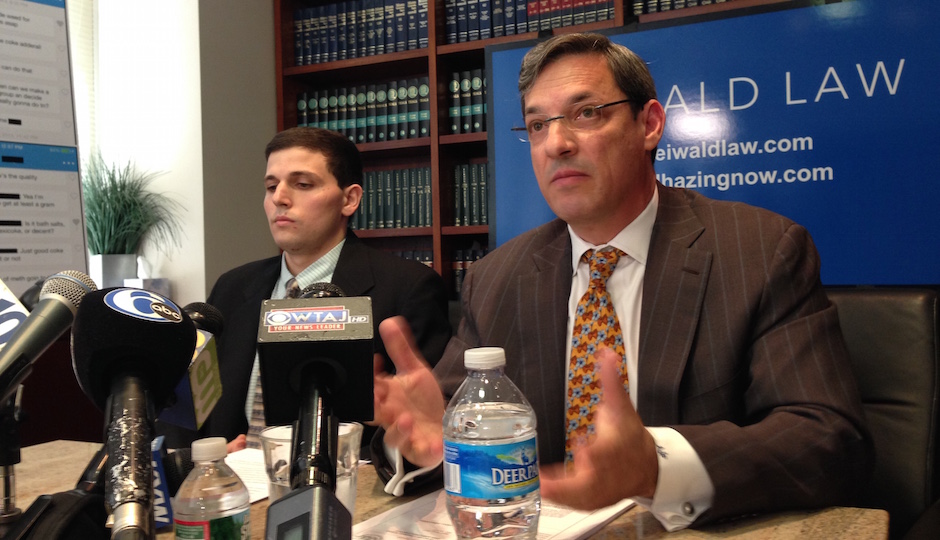Facebook Frat Whistleblower: Penn State Did Nothing for Months After I Told Them About Abuse
Did Penn State learn anything in the wake of the Jerry Sandusky scandal?
Not if you believe a lawsuit filed Monday on behalf of James Vivenzio, the 21-year-old whistleblower who told authorities this January that the fraternity Kappa Delta Rho was running a secret Facebook page where members allegedly posted images of nude, unconscious women, drug sales and hazing.
At a Monday press conference about his lawsuit, Vivenzio, a former KDR brother, and his lawyer Aaron Freiwald made a number of stunning allegations about the frat and Penn State. Perhaps the most shocking among them is that Vivenzio said he told university officials about KDR’s alleged Facebook page months before he went to the police, but they did nothing.
Penn State spokeswoman Lisa Powers said in a statement that the university “strongly disputes the allegations in this complaint.”
Here are the details of the suit:
- Vivenzio said he was repeatedly hazed by KDR members from 2012 to 2014. For instance, according to the lawsuit, he and other students pledging to KDR were forced to regularly go in the middle of the night to the frat’s basement, where they were told to drink from a bucket of liquid. The bucket “would include a mixture of ingredients such as hot sauce, hard liquor, urine and, by the time it would be passed around to the first or second pledge in the lineup, vomit,” said Freiwald. The hazing ritual was only complete, he said, when “the entire contents of the bucket were consumed.”
- When a pledge attempted to leave a fraternity event or the frat itself, physical violence and psychological intimidation were used to force them to stay, Freiwald said. For instance, when Vivenzio refused to go to one of the bucket rituals, “one of the members interested in enforcing the requirement that pledges attend punched him multiple times in the face,” said Freiwald. Not only that, but pledges were made to understand that “even if one member of the pledge class should decide to leave … that’s only going to make it harder for the pledges that remain,” he said. Take the bucket ritual, for instance: “The way it worked was that the last person in line had to consume everything that was left in that bucket. So that means that the first 18 [pledges] understand that if they don’t do their share, they’re only going to leave the last one in line with that much more that that person has to consume,” said Freiwald.
- Vivenzio said that he initially told university officials about KDR’s alleged hazing by calling Penn State’s anonymous hazing hotline. Freiwald said that “was very quickly leaked, he found out, to all the members of the fraternity, and an effort was then made within the fraternity house to figure out who the ‘rat’ was.”
- Then, in April 2014 — about eight months before Vivenzio went to the police — he said he met with Danny Shaha, a senior investigator in Penn State’s Office of Student Conduct, to discuss his experience at KDR. He said he told Shaha about the alleged hazing, drug sales and Facebook pages, and showed him reams of evidence, including text messages and screen shots. Since then, no one from Penn State has met with Vivenzio to discuss his allegations or to collect the evidence to this day, according to the lawsuit. Freiwald said the first time the university took action to address Vivenzio’s concerns, as far as he knows, was last month, when it announced it was shutting down the the KDR chapter for three years. PSU vehemently denied this. Spokeswoman Powers said the school “offered [Vivenzio] extraordinary assistance on numerous occasions,” but “neither he nor his family were willing to file a complaint, provide documentation, speak with State College police or participate in pursuing the formal disciplinary process available to them, despite repeated encouragement from university staff.” She also said Vivenzio did not tell university officials about the alleged Facebook page.
- Finally, Vivenzio decided to tell the police about his concerns in January of this year. His allegations prompted an investigation into KDR, which is ongoing. Still, according to Freiwald, police only contacted him for a follow-up meeting as recently as a couple weeks ago. Due to scheduling conflicts, he said, they still have not met.
Vivenzio’s lawsuit, filed in Philadelphia’s Court of Common Pleas, names as defendants Penn State University, the national and local chapters of KDR, the university’s Interfraternity Council, and the Panhellenic Association.
On Monday, the national KDR fraternity said it is expelling 38 members from the Penn State chapter.
Follow @HollyOtterbein on Twitter.
Previously: Member of Penn State’s Kappa Delta Rho Defends Fraternity



